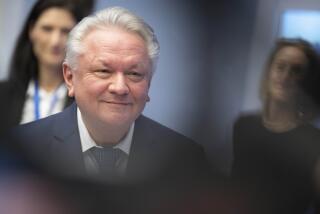1945 U.S. Plan for Chemical Attack on Japan Told
- Share via
TOKYO — U.S. military planners proposed a chemical weapons attack on Japan in 1945 that could have been far more devastating than the atomic bombings of Hiroshima and Nagasaki, according to newly discovered U.S. documents shown Saturday.
The documents, which were written by the U.S. Army’s Chemical Warfare Service in June, 1945, were declassified in 1958 but largely ignored, said a Japanese researcher who obtained copies recently near Washington.
Yoshiaki Yoshimi quoted the papers as saying that a “sudden, full-scale use” of chemical weapons on Tokyo, Osaka, Yokohama and nearly two dozen other Japanese cities “might easily kill 5 million people and injure as many more.”
Researchers in Japan previously were unaware that the United States had such detailed possible attack plans.
Nearly 200,000 people died in the U.S. bombings of Hiroshima and Nagasaki in August, 1945, and tens of thousands of others later died of bomb-related illnesses. Japan capitulated five days after Nagasaki was bombed.
Yoshimi, a professor of history at Tokyo’s Chuo University, showed the documents at a symposium on chemical warfare after returning from two years of research in the United States.
He said he obtained copies of the documents from the Aberdeen Proving Ground Historical Office outside Washington.
Japan is known to have used chemical weapons during its campaigns in China and in Southeast Asia. In 1942, President Franklin D. Roosevelt warned that the United States would respond “in kind” to the use of “such desperate and barbarous methods” against any of the Allies.
The threat was never carried out.
Like the atomic bomb, chemical weapons were apparently viewed as a possible means of bringing the war to an end sooner than conventional warfare, thus sparing American lives, Yoshimi said.
“The United States did not seem to be very interested in using chemical weapons against Japan at first,” he said after the presentation. “But the idea was more aggressively pursued as the possibility of increased American casualties grew.”
More to Read
Sign up for Essential California
The most important California stories and recommendations in your inbox every morning.
You may occasionally receive promotional content from the Los Angeles Times.













